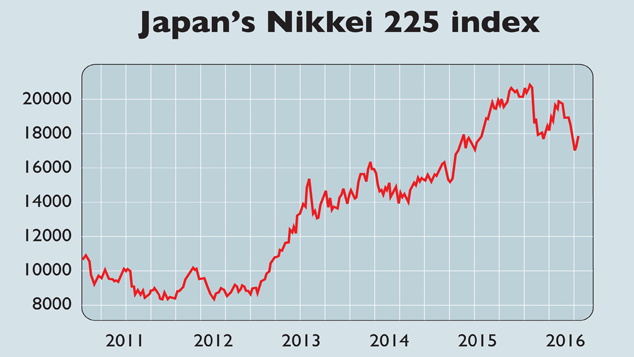
“If China wants a lesson in how to shock markets without upsetting them, it could look to its neighbour,” says Lex in the FT. Japanese stocks bounced by around 3% as the Bank of Japan announced a reduction in interest rates from 0.1% to -0.1%, thus joining the European, Swiss, Danish and Swedish central banks in negative territory. Japanese banks will now have to pay the central bank 0.1% if they park cash with it.
Only a few weeks ago, the Bank of Japan governor, Haruhiko Kuroda, was adamant that he would not cut rates below zero. This “shock move” is Kuroda’s attempt to “regain his credibility as a deflation fighter”, says the FT’s Robin Harding.
In the past few months, with China’s slowdown rattling the markets, fears grew that Japanese inflation was looking less and less likely to reach the 2% target. That in turn could undermine investment and confidence, making the problem self-fulfilling. Last week the Bank was forced to downgrade its inflation forecast, so it was all the more important that it regain the initiative. Cue Kuroda’s surprise move.
Being charged to hold reserves with the central bank should in theory encourage banks to lend it out or invest it instead, spurring growth. But unlike in Europe, the negative rate will apply to new reserves, not existing ones, so there will be scant immediate economic impact.
This is primarily a matter of psychology. “As a signal of intent, the move is powerful,” says Adam Cole of RBC Capital Markets. The Bank now has a new tool to fight Japan’s chronic deflation, having already inflated its balance sheet to 75% of Japan’s GDP with its bond purchases through quantitative easing. “This is a very big regime change,” says Masaaki Kanno of JPMorgan. It’s a clear sign that it will do whatever it takes to create inflation.
Looser monetary policy is not the only reason to like Japanese stocks. Japan is on a cyclically adjusted price/earnings ratio of 25, below the median since 1969 of 38, says John Authers in the FT.
Most sectors of the wider market are cheaper than their average valuation since 2000, while firms are more profitable. Earnings have climbed to 3.5% of GDP, double their level of 20 years ago. Japanese firms are sitting on cash mountains, so dividends and share buybacks should rise. Japan also has “everything to gain from cheaper crude”, says Authers. It remains a buy.